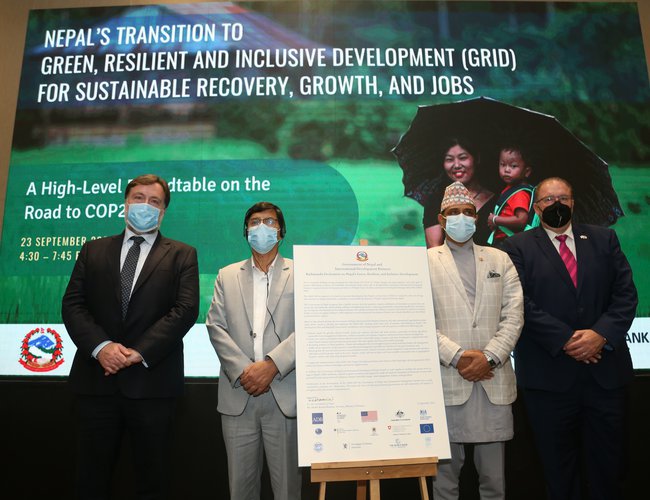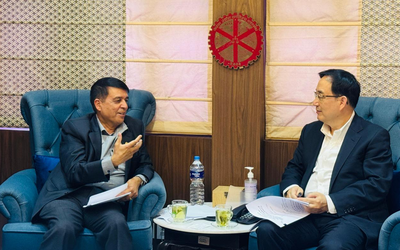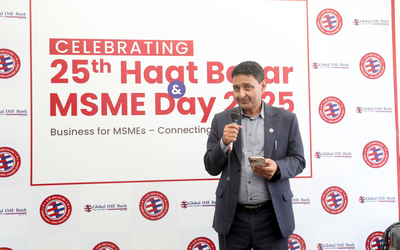
Although Nepal and development partners have been promoting green, resilient and inclusive development for long, they have agreed to work together as per a landmark Kathmandu Declaration.
Following intensive discussions, Nepal government and development partners endorsed the landmark ‘Kathmandu Declaration’ recently to develop a strategic action plan for Nepal towards Green, Resilient, and Inclusive Development (GRID).
Endorsed by the Ministry of Finance on behalf of the Government of Nepal, Asian Development Bank, Australia, European Union, Finland, France, Germany, International Monetary Fund, Norway, Republic of Korea, Switzerland, United Kingdom, United Nations, United States, and the World Bank at a high-level roundtable event titled Nepal’s Transition to Green, Resilient, and Inclusive Development (GRID) for Sustainable Recovery, Growth, and Jobs, the Declaration is the first of its kind document to direct Nepal’s development.
Under the Kathmandu Declaration, Nepal’s development partners have identified up to $4.2 billion in potential future support, in addition to the $3.2 billion in previously committed resources to support GRID.
The GRID Strategic Action Plan will coordinate international and domestic financing for priority investments in Nepal’s recovery from the crisis caused by the COVID-19 pandemic.
“The Government of Nepal is committed to the Green, Resilient, and Inclusive Development vision that will support Nepal’s recovery from the COVID-19 pandemic and help address the challenges of climate change and rising inequality,” said Finance Minister, Janardan Sharma. “We look forward to working together with development partners, private sector, and key stakeholders to build back Nepal better and stronger.”
Investments will support Nepal’s 15th development plan, Nationally Determined Contribution to the Paris Climate Accords, and the Sustainable Development Goals in promoting green growth, jobs, and infrastructure, and building resilience to climate change and shocks from disasters, as well as equitable access to services for Nepalis.
The government and development partners intend to scale up support for such areas as sustainable tourism, renewable energy, cleaner transport and resilient roads, integrated solid waste management, sustainable forest management, watershed protection and water supply, biodiversity conservation, adaptive social protection, climate-smart agriculture, and sustainable cities. Partnerships and opportunities will be sought with the private sector to increase green investment and support job-creating small and medium enterprises and businesses in these and other areas.
Nepal’s GRID vision also emphasizes inclusion to enable women, indigenous groups, and vulnerable and marginalized communities to realize the benefits of a green, resilient recovery. This includes skills training and education opportunities to help citizens prepare for an evolving job market in a new green economy with greater opportunities for all Nepalis.
The roundtable, organized in the lead up to COP26, included representatives from the federal and local government, development partners, private sector, and climate experts.
Endorsing the declaration, Nepal’s development partners have announced that they will back the guidance and commitment laid down in the declaration while supporting Nepal’s development efforts. What they said follows.
Hartwig Schafer, World Bank Vice President for South Asia: “The World Bank has committed globally to align all its financing to the objectives of the Paris Agreement on climate change by July 1, 2023. We are honored to support Nepal’s GRID agenda to guide investment and policy directions in line with its Nationally Determined Contribution and Sustainable Development Goals targets.”
Ken O’Flaherty, UK Regional Ambassador for Asia Pacific and South Asia at COP26 Climate Summit: “The GRID approach being adopted in Nepal is a world class example of how countries can mobilize resources for sustainable development and ambitious climate action. I hope that Nepal can showcase this approach at COP26 and encourage others to do likewise.”
Shixin Chen, Vice-President, South Asia Department and Central and West Asia Department, Asian Development Bank: “ADB is committed to ensuring 75% of the total number of ADB’s operations and $80 billion investments will support climate change adaptation and mitigation by 2030. We welcome Nepal’s GRID agenda and affirm our strong commitment to work with all stakeholders to advance the integration of climate and development to achieve a resilient, inclusive and sustainable economy.”
Jean-Louis Ville, Acting Director for Asia, Central Asia, Middle East/Gulf and the Pacific, European Commission: “Globally, Team Europe contributes 25 billion dollars per year for climate finance. As Team Europe, together with our Member States Finland, France and Germany and the European Investment Bank, the EU is also committed to achieve a Green Recovery in Nepal.”
Dr. Anne-Marie Gulde-Wolf, IMF Deputy Director, Asia and Pacific Department: “The IMF welcomes the launch of the GRID agenda. We will continue to support Nepal’s recovery from the pandemic and their focus on macroeconomic stability, building resilience, promoting sustainable and inclusive growth, and addressing the challenges of climate change.”
Neil Buhne, Regional Director, United Nations Development Coordination Office, Asia-Pacific: "Because of the disproportionate impacts of climate change on women and socially vulnerable groups, Nepal’s NDC prioritized developing a gender and social inclusion and climate action strategy and action plan. We can accelerate climate action, sustainable development and green recovery by helping to unlock the economic potential of women, indigenous and disadvantaged groups. Inclusion, equity and the environment go together.
Accepting ‘Kathmandu Declaration, which aims to develop a strategic action plan for Nepal towards Green, Resilient, and Inclusive Development (GRID), Nepal government and development partners have charted out a future direction for the development.
- MELAMCHI WATER SUPPLY: No Interruption During Monsoon
- Jun 25, 2025
- KOREAN RETURNEES: Successful Integration
- Jun 25, 2025
- UPPER TRISHULI-1: Engaging With Local
- Jun 25, 2025
- IME GROUP: Twenty Five Years Of Journey
- Jun 24, 2025
- NEPAL’S AIR POLLUTION: A Growing Health Concern
- Jun 24, 2025















